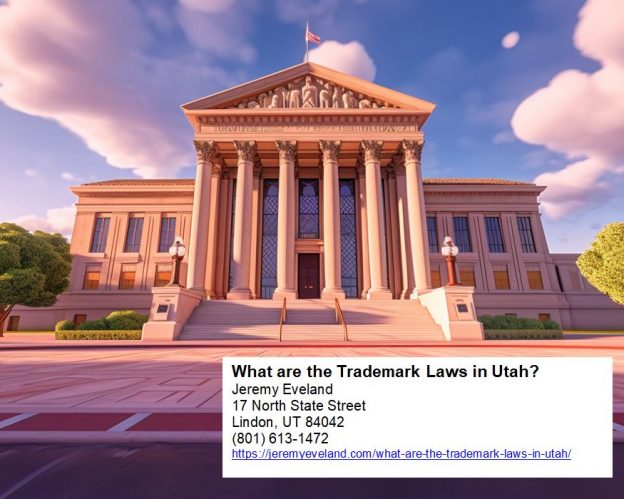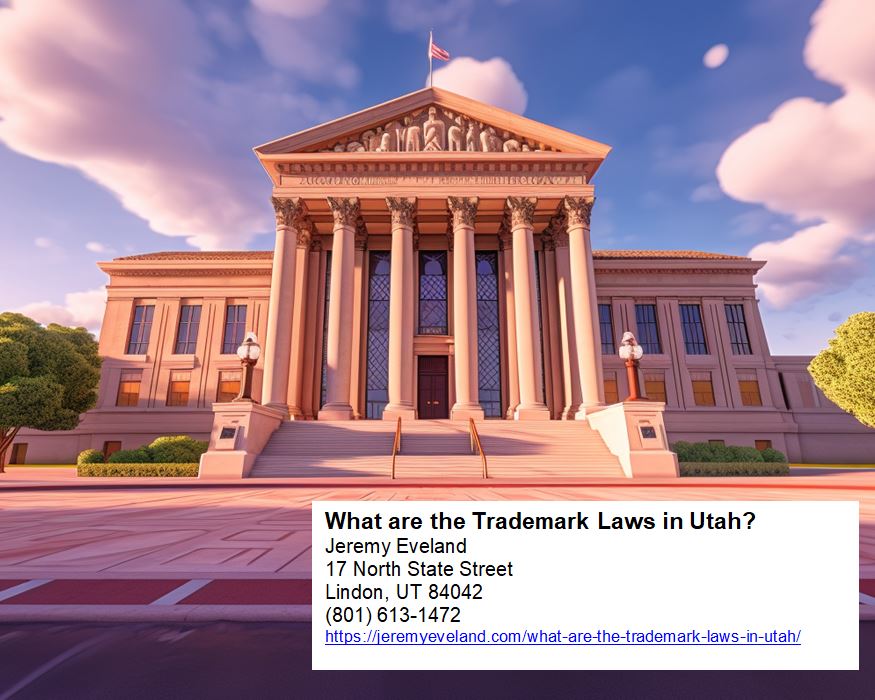Are you a business owner in Mapleton, Utah? Do you have concerns about protecting your intellectual property? Look no further. Our Intellectual Property Lawyer in Mapleton, Utah is ready to assist you in navigating the complexities of intellectual property law. With years of experience and a deep understanding of this specialized area, our lawyer is here to provide expert guidance and representation. Whether you need help with patents, trademarks, copyrights, or trade secrets, we have the knowledge and skills to protect your valuable assets. Don’t risk the security of your intellectual property. Call our lawyer today for a consultation and take the first step towards safeguarding your innovations and creative works.
What is Intellectual Property?
Intellectual property refers to creations of the mind, such as inventions, literary and artistic works, symbols, names, and designs, which are used in commerce. These intangible assets are protected by various forms of legal rights, which grant the creators or owners exclusive rights to their creations. It allows them to control and profit from their intellectual efforts.
Definition of Intellectual Property
Intellectual property encompasses a wide range of creations, including patents, trademarks, copyrights, and trade secrets. These legal rights provide the creators or owners protection against unauthorized use or exploitation of their intellectual assets. It allows them to maintain a competitive advantage in the marketplace and reap the rewards of their innovations.
Types of Intellectual Property
-
Patents: Patents protect inventions, providing exclusive rights to the creator for a limited period of time. They prevent others from making, using, or selling the patented invention without the creator’s permission.
-
Trademarks: Trademarks are symbols, names, or logos that distinguish the goods or services of one business from others. They provide brand recognition and protection against unauthorized use or imitation by competitors.
-
Copyrights: Copyrights protect original works of authorship, such as books, music, art, films, and software. They grant the creator exclusive rights to reproduce, distribute, perform, display, and create derivative works based on their original creation.
-
Trade Secrets: Trade secrets are confidential and proprietary information that give a business a competitive advantage. It can include formulas, processes, customer lists, and techniques that are not generally known or readily accessible.
Why Businesses Need an Intellectual Property Lawyer
As a business owner, it is crucial to understand the importance of intellectual property and the need for legal protection. An intellectual property lawyer can guide you through the complex legal landscape and help safeguard your valuable assets.
Protecting Intellectual Property Assets
An intellectual property lawyer can assist you in identifying, protecting, and managing your intellectual property assets. They can conduct thorough searches to ensure that your inventions or trademarks do not infringe upon existing rights. By filing appropriate applications and registrations, they can secure legal protection for your creations and prevent others from exploiting them without authorization.
Enforcing Intellectual Property Rights
In the event of intellectual property infringement, an intellectual property lawyer can help you enforce your rights. They can assist in sending cease and desist letters, negotiating settlements, and representing you in litigation if necessary. This ensures that your intellectual property is respected and that you can take appropriate legal action against those who violate your rights.

Services Offered by an Intellectual Property Lawyer
An intellectual property lawyer offers a range of services to protect and enforce your intellectual property rights. These services include:
Trademark Registration and Protection
An intellectual property lawyer can guide you through the process of trademark registration and provide advice on selecting strong and distinctive trademarks. They will conduct a comprehensive search to ensure your trademark is not already in use and assist you in filing the necessary applications to secure legal protection.
Copyright Registration and Protection
An intellectual property lawyer can help you register your original works of authorship with the copyright office. By obtaining copyrights, you gain exclusive rights to reproduce, distribute, perform, display, and create derivative works from your creations.
Patent Registration and Protection
If you have invented a new and useful process, machine, or composition of matter, an intellectual property lawyer can assist you in filing a patent application. They will work closely with you to draft and submit a detailed application, ensuring the best chance of obtaining a patent for your invention.
Trade Secret Protection
An intellectual property lawyer can help you identify and protect your trade secrets through the implementation of confidentiality agreements, non-disclosure agreements, and other protective measures. They can also advise you on best practices for maintaining the secrecy of your proprietary information.
Infringement Litigation
In the unfortunate event of intellectual property infringement, an intellectual property lawyer can represent you in litigation. They will develop a comprehensive legal strategy to protect your rights, negotiate settlements, and pursue legal action to stop the infringement and seek appropriate remedies.
Benefits of Hiring an Intellectual Property Lawyer
Hiring an intellectual property lawyer offers several benefits for businesses seeking to protect their intellectual assets. Some of these benefits include:
Expertise and Experience in IP Law
Intellectual property lawyers specialize in the intricacies of intellectual property law. They have extensive knowledge and experience in navigating the legal system and understand the complexities of registration, enforcement, and defense of intellectual property rights. By hiring an expert in the field, you can ensure that your intellectual property is properly protected and enforced.
Customized Strategies for IP Protection
Every business has unique intellectual property assets and goals. An intellectual property lawyer can tailor strategies specifically to your business, taking into account your industry, niche, and competition. They can recommend the most effective methods of protection and enforcement based on your individual needs.
Efficient Handling of IP-related Matters
Managing intellectual property can be time-consuming and complex. An intellectual property lawyer can handle all legal aspects, saving you valuable time and resources. They will ensure that deadlines are met, paperwork is filed correctly, and potential issues are addressed promptly and effectively.
Prevention of Legal Issues
By proactively working with an intellectual property lawyer, you can prevent potential legal issues before they arise. They can help you identify potential risks, conduct audits of your intellectual property portfolio, and develop strategies to mitigate those risks. Their expertise can help you navigate the legal landscape and avoid costly disputes.

How to Choose an Intellectual Property Lawyer
When selecting an intellectual property lawyer, it is essential to consider specific factors to ensure you find the right match for your business. Some key considerations include:
Specialization in Intellectual Property Law
Look for a lawyer who specializes in intellectual property law. They should have a deep understanding of patents, trademarks, copyrights, and trade secrets, as well as experience in handling intellectual property disputes.
Reputation and Track Record
Research the lawyer’s reputation and track record in the field of intellectual property law. Look for testimonials, reviews, or case studies that highlight their successes in protecting and enforcing intellectual property rights.
Communication and Availability
Effective communication with your intellectual property lawyer is crucial. Choose a lawyer who is responsive, attentive, and accessible. They should be able to explain complex legal concepts in a clear and understandable manner.
Fees and Cost Structure
Discuss fees and cost structures with potential intellectual property lawyers. Transparency is essential, and you should have a clear understanding of how they bill and what services are included. It’s important to find a lawyer who provides value for their services and fits within your budget.
Frequently Asked Questions
What is the difference between a trademark and a copyright?
A trademark protects symbols, names, or logos that distinguish the goods or services of one business from others. It provides brand recognition and prevents others from using similar marks that could cause confusion in the marketplace. On the other hand, a copyright protects original works of authorship, such as books, music, art, films, and software. It grants the creator exclusive rights to their original creation and prohibits others from reproducing or distributing it without permission.
How long does trademark registration take?
The timeframe for trademark registration can vary depending on several factors, including the complexity of the application and the backlog at the trademark office. Generally, it can take anywhere from several months to over a year to complete the registration process.
What can I do if someone is infringing on my intellectual property?
If someone is infringing on your intellectual property, it is important to consult with an intellectual property lawyer promptly. They can help you assess the situation, gather evidence, and determine the best course of action. This can include sending cease and desist letters, negotiating settlements, or pursuing legal action through litigation.
Do I need a lawyer to register a trademark?
While it is possible to file a trademark application without a lawyer, working with an intellectual property lawyer can significantly increase your chances of success. They can assist you in conducting comprehensive searches, ensuring your trademark is distinctive, and filing the necessary applications correctly.
How can I protect my trade secrets?
To protect your trade secrets, it is essential to implement robust confidentiality and security measures. This can include non-disclosure agreements, limited access to sensitive information, and secure storage systems. Working with an intellectual property lawyer can help you develop and implement effective trade secret protection strategies.































